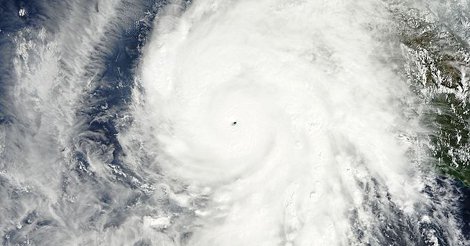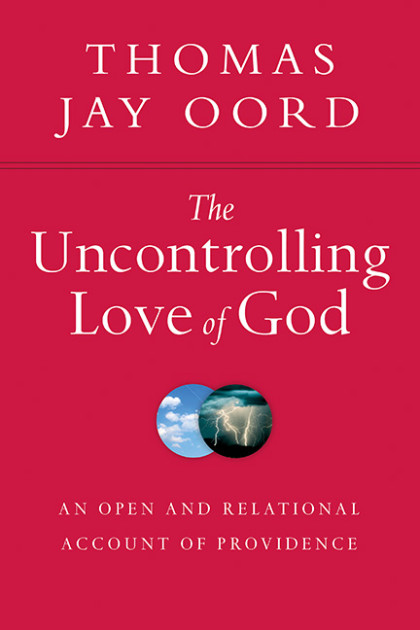
This week, I have the opportunity to review a book that will be released shortly: The Uncontrolling Love of God: An Open and Relational Account of Providence by Thomas Jay Oord. It’s not strictly about science or natural theology, but it addresses a frequent topic in the science/faith dialogue. Oord offers his approach to the problem of evil–how can bad things exist in a world created by a good God? He does so in a context which acknowledges current scientific models. While that might sound somewhat daunting, the whole thing is presented in a straightforward fashion, regularly engaging with common experience for wide accessibility.
The book starts with a survey of the kinds of evils we encounter in the world, allowing Oord to acknowledge the genuine harm these events cause and the real challenge explaining them poses. He then explores the role that natural phenomena play in causing harm, as in hurricanes or droughts, and the role of human activity, as with the Boston Marathon bombing. In both situations, he makes the case that genuine freedom is at play. While there is a lot of metaphysical baggage that comes with any conversation about freedom and free will, Oord takes a fairly pragmatic approach. If most of us act as if we have free will, that’s meaningful in and of itself. That kind of straightforward thinking is typical of the whole book, which I think would make it appealing to a lay audience.
Having made a case for genuine evil and genuine freedom in the world, Oord moves on to exploring the various models people use to describe how God interacts with the physical world. To my mind, this section alone is worth the price of admission. Since many faith traditions focus on just one of these models, I think many people will find it helpful and revealing to see what some of the other options are, even in brief summaries. Oord evaluates each model on how well it explains genuine evil and genuine freedom. As you might imagine, he concludes that his approach handles these best, but even if you come to a different conclusion I think the treatment is worthwhile.

The second half of the book expands on Oord’s model of providence. It has two main elements. As suggested by the title, one is an open view of the future, meaning that the precise events of the future are presently unsettled and unknowable. The other is something Oord calls essential kenosis, by which he means that God’s self-emptying love is fundamental to God’s nature. Consequently, God cannot fully take control of what would otherwise be the freedom of a created entity. I oversimplified it for myself by thinking that God is, at his core, a giver not a taker.
I think it is fair to say that both of these ideas are each challenging. Oord makes his case for why both are consistent with what is revealed about God in the Bible, and how both have antecedents in the history of Christian tradition and teaching. Your mileage may vary when it comes to these accounts. However, I would commend both an open view of the future and essential kenosis to you as worthy of consideration. As I’ve discussed previously, I think there is value in articulating one’s understanding of God in a way that is clear enough to be evaluated. I believe Oord has done precisely that, and I appreciate the risk he is taking to do so.
For myself, I found much that made sense and also some questions that remained open. For one, it’s not clear to me that the combination of an open future and essential kenosis is necessary. If God doesn’t know what will actually happen until it actually happens, can he be culpable for not preventing evil events? I think an answer would require a fairly detailed exploration of the precise timing of when God knows what; such detail is probably beyond the scope of this book but still probably necessary for a complete treatment. And coming from the other direction, if God cannot fully take control of otherwise free choices, does it matter when he knows what will actually happen in the future? I can see where the two ideas complement each other, but I still wonder whether either would be sufficient by itself.
I was also a little puzzled by the last chapter’s treatment of miracles. Since God cannot fully control creation under Oord’s model of providence, miracles always require cooperation. In other words, God cannot unilaterally cause a miracle. At the same time, Oord wishes to retain a certain special quality to miracles. I take that to mean that God especially seeks cooperation at certain times and not others, in order to bring about miracles. For me, that brings us back to the first question of why God doesn’t prevent more evil. If he can sometimes seek the kind of special cooperation involved in a miracle, why not other times? How does God choose when to pursue a miracle?
Still, even in light of lingering questions, I appreciate the opportunity to more precisely articulate those questions as a result of having read the book. And I appreciate the way Oord folds science into the conversation. I wouldn’t say that science is the main driver of the discussion, but Oord allows for the reality that a scientifically engaged population will be part of his audience. For those reasons, if you like reading my posts, I think you will find this book worthwhile.
Updated: Here’s the author himself elaborating on the questions he’s grappling with in this book. I think it provides some flavor of his approach.
Andy has worn many hats in his life. He knows this is a dreadfully clichéd notion, but since it is also literally true he uses it anyway. Among his current metaphorical hats: husband of one wife, father of two teenagers, reader of science fiction and science fact, enthusiast of contemporary symphonic music, and chief science officer. Previous metaphorical hats include: comp bio postdoc, molecular biology grad student, InterVarsity chapter president (that one came with a literal hat), music store clerk, house painter, and mosquito trapper. Among his more unique literal hats: British bobby, captain’s hats (of varying levels of authenticity) of several specific vessels, a deerstalker from 221B Baker St, and a railroad engineer’s cap. His monthly Science in Review is drawn from his weekly Science Corner posts — Wednesdays, 8am (Eastern) on the Emerging Scholars Network Blog. His book Faith across the Multiverse is available from Hendrickson.

Leave a Reply